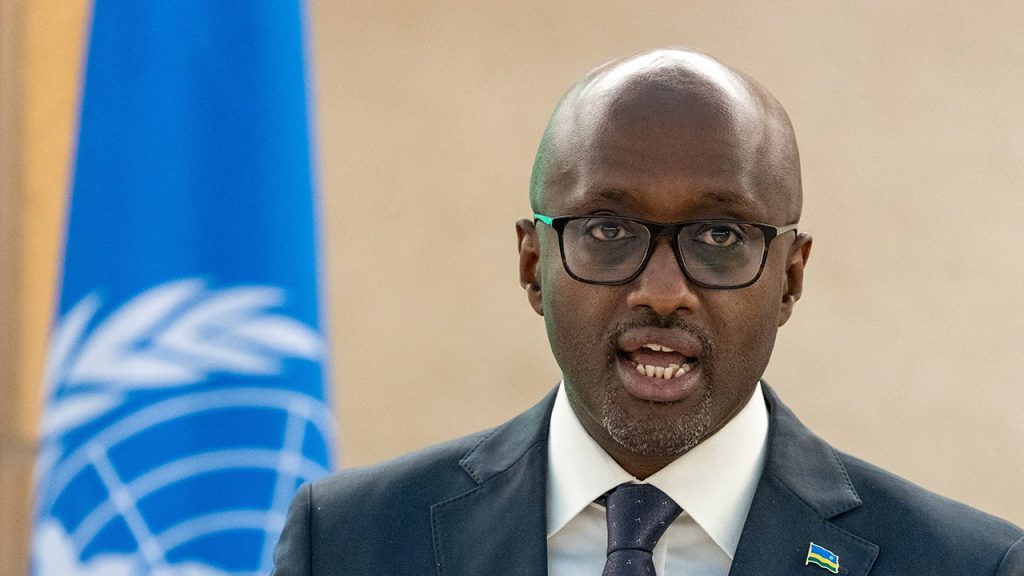In recent developments, Rwanda appears to be engaged in discussions with the United States regarding the potential reception of migrants deported during the Trump administration. Rwandan Foreign Minister Olivier Nduhungirehe confirmed that these talks are still in the early stages, as various entities, including the U.S. State Department, are working to manage and reform immigration policies. At a meeting, U.S. Secretary of State Marco Rubio emphasized the need for international cooperation to address illegal immigration and deportations.
| Article Subheadings |
|---|
| 1) Diplomacy and Migration: Rwanda’s Commitment |
| 2) U.S. Policies and Their Impact |
| 3) Controversy Surrounding Deportations |
| 4) Previous Arrangements: Lessons from the UK |
| 5) The Future of U.S.-Rwanda Relations |
Diplomacy and Migration: Rwanda’s Commitment
Discussions between the Rwandan government and the United States regarding the resettlement of deported migrants have gained attention in light of recent statements made by Olivier Nduhungirehe. He noted that while the discussions are ongoing, it is too early to define the specifics of a potential agreement. The talks reportedly aim to create a framework where Rwanda would accept migrants deported from the U.S., largely stemming from policies enacted during the Trump administration.
The Rwandan government has expressed a willingness to consider the U.S. offer as it seeks to strengthen bilateral relations. This move aligns with Rwanda’s broader strategy of enhancing international partnerships to bolster its reputation on the global stage. However, details about the number of migrants involved and the terms of their acceptance remain unclear.
U.S. Policies and Their Impact
The U.S. government has been vocal about its commitment to changing immigration policies that have led to mass deportations. A spokesperson from the State Department indicated that addressing the crisis of illegal migration remains paramount. The official stated that collaboration with international partners is crucial for implementing strategies designed to manage immigration more effectively.
At the forefront of this initiative is Marco Rubio, who articulated the necessity of seeking countries willing to accept deportees. During a Cabinet meeting, he underscored the importance of diplomatic relations revolving around the mutual benefit of returning nationals living in the U.S. unlawfully. This has prompted numerous countries to engage in dialogue with the U.S. concerning their responsibilities and roles in the broader immigration discussion.
Controversy Surrounding Deportations
The deportation agenda has sparked considerable backlash from various civil rights groups and even some lawmakers. Concerns revolve around the ethical implications of cracking down on undocumented individuals, especially those who may have established lives and families in the U.S. Critics argue that the deportation policies disproportionately affect marginalized communities and can lead to dire consequences for those individuals.
The Human Rights Watch has raised alarms by pointing out that many deportees face risk factors, such as persecution or lack of resources, upon return to their home countries. In Rwanda specifically, a 2023 human rights report unveiled issues surrounding arbitrary detentions and political repression, raising questions about the safety and human rights of any migrants returned.
Previous Arrangements: Lessons from the UK
Rwanda’s experience with migrant resettlement is not without its challenges. In 2022, the country had forged an agreement with the United Kingdom to accept thousands of asylum seekers; however, that deal was scrapped due to domestic political shifts in the UK, particularly under the leadership of Prime Minister Keir Starmer.
The U.K. decision to halt the resettlement agreement has put a spotlight on Rwanda’s capacity and willingness to accept migrants from other nations. This scenario is instructive for the discussions with the U.S., as it underlines the complexities and uncertainties inherent in international agreements concerning migration.
The Future of U.S.-Rwanda Relations
As the discussions unfold, the potential partnership between the U.S. and Rwanda may significantly impact future immigration policies. Depending on how the negotiations progress, this could pave the way for a more substantial bilateral relationship that extends beyond migration issues. Rwanda’s government could see benefits in terms of financial aid or political support from the U.S. in exchange for its cooperation on deportations.
As both nations seek to navigate the complexities of their diplomatic ties, the outcome of these discussions could serve as a template for future cross-border cooperation on immigration issues. It remains to be seen how potential agreements will affect the lives of those deported and how Rwanda will manage the integration process of these individuals into its society.
| No. | Key Points |
|---|---|
| 1 | Rwanda is in early discussions with the U.S. regarding the acceptance of deported migrants. |
| 2 | U.S. immigration policy reform is a priority for the Biden administration. |
| 3 | Concerns arise over the implications of deportations for migrants’ safety and human rights. |
| 4 | The scrapping of the UK-Rwanda deal raises questions about the effectiveness of such migration arrangements. |
| 5 | The outcome of U.S.-Rwanda talks could influence future immigration policies worldwide. |
Summary
The unfolding dialogues between Rwanda and the U.S. concerning the deportation of migrants represent a significant development in international immigration policy. As officials from both countries explore this sensitive issue, the broader implications for future migration agreements and their associated human rights considerations will be crucial. The clarity of these discussions will dictate not only the fates of individuals facing deportation but also the long-term diplomatic relations between Rwanda and the United States.
Frequently Asked Questions
Question: What potential benefits could Rwanda gain from accepting deported migrants?
Rwanda may receive financial aid or political support from the U.S. government as part of any agreements made regarding the acceptance of deported individuals.
Question: What are the risks for migrants being deported to Rwanda?
Migrants deported to Rwanda could face safety issues and human rights concerns based on reported political repression and arbitrary detentions in the country.
Question: How might U.S.-Rwanda discussions affect global immigration policies?
The outcome of these discussions could influence how other nations approach migrant resettlement and deportation agreements, possibly leading to a shift in global immigration policies.
